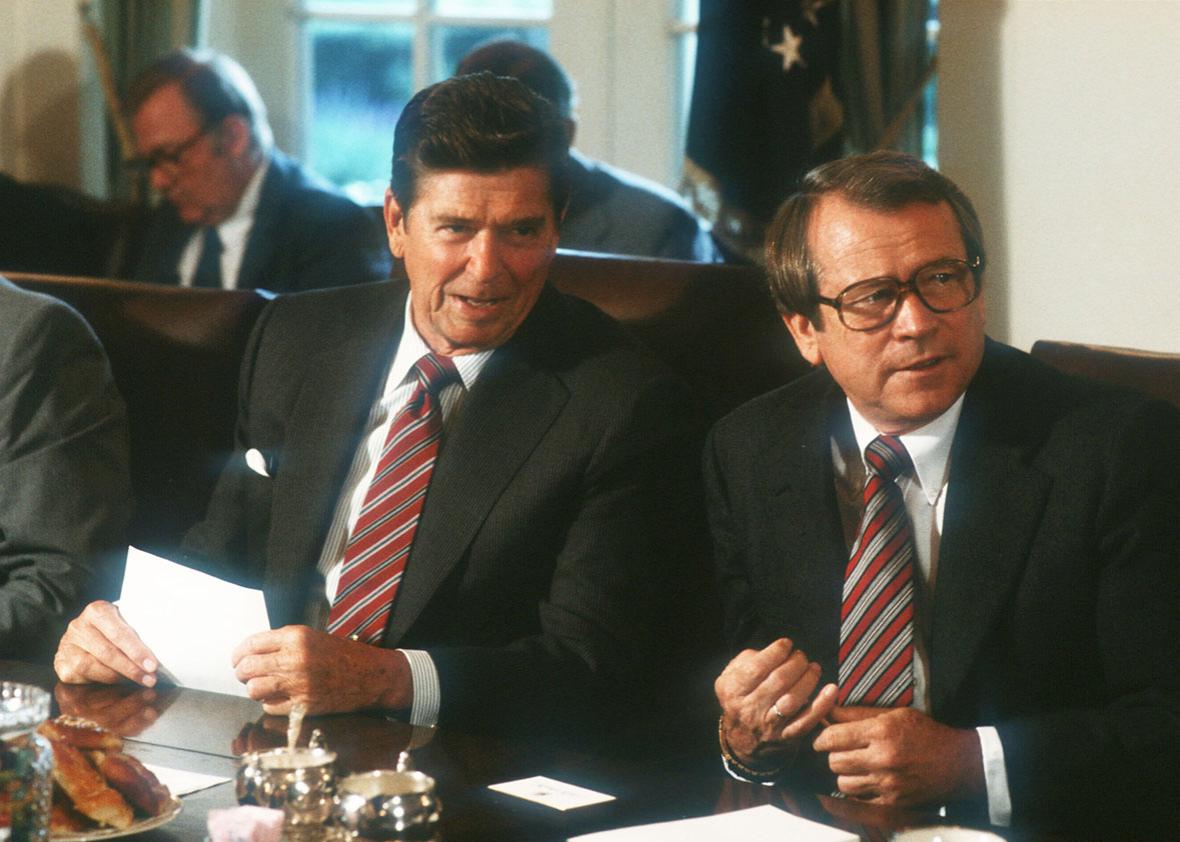This article appears in slightly different form in the Financial Times.
At the height of the Watergate scandal, Republicans found themselves facing an unenviable dilemma: whether to break with the lawbreaker Richard Nixon or remain faithful to party and president. Howard Baker, the senior Republican on the Senate Watergate committee, took the courageous route and pressed the investigation forward. He became famous for asking: “What did the president know and when did he know it?” After Nixon resigned, Baker went on to become Senate majority leader, White House chief of staff, and ambassador to Japan. He died in 2014, his name synonymous with political integrity.
One of Baker’s fellow Republicans on the Watergate committee, a handsome World War II hero named Edward Gurney, followed the opposite course. He earned Nixon’s gratitude by staying loyal until the bitter end. Soon after the president resigned to avoid impeachment, Gurney left the Senate under a cloud of corruption charges. Though exonerated in court, he was unable to win back even a House seat. He ended a sad figure peddling property in Florida. When he died, the headline on his obituary read, “E.J. Gurney, 82, Senator Who Backed Nixon.”
Republicans understand that Donald Trump’s pending nomination presents another reputation-defining moment. Yet nearly all are making their decisions on the basis of self-interest, rather than principle. Those who would break with their party face daunting consequences, including the denial of campaign funds from their national party, the risk of losing votes from Trump’s supporters, and the expectation of frontal attacks by the likely nominee himself.
It should take nothing away from those standing against Trump to point out that they tend to be those least likely to suffer for doing so, such as conservative intellectuals and retired politicians. The living former Republican presidents, George H.W. Bush and George W. Bush, said last week that they would not endorse him. Lindsey Graham, the South Carolina senator who has been Trump’s most trenchant antagonist, tweeted after the Indiana primary:
Note, however, that Graham does not stand for re-election until 2020, when a different Republican will probably be heading his ticket.
We have heard less from those with more to lose. Kelly Ayotte, a New Hampshire senator up for re-election, says she will “support” Trump but not “endorse” him, a distinction without a difference. Paul Ryan, speaker of the House of Representatives and chairman of the Republican National Convention, says he is “not ready” to endorse Trump. One wonders how long Ryan can remain in this indeterminate state, between the motion and the act, while absorbing threats from Sean Hannity and other Trump supporters.
Why are politicians who disdain Trump so reluctant to oppose him directly? The first reason is that Republicans are hierarchical and much less inclined to break ranks than Democrats. None wants to be identified as helping his or her party accept a necessary defeat. There is also the matter of financial consequences. The House and Senate campaign committees that direct hundreds of millions of dollars to candidates will soon come under Trump’s sway. Staffers at the Republican National Committee have been told that they can support the Republican nominee or find new jobs. Candidates also fear Rupert Murdoch’s media machine, which has fallen into formation behind Trump.
Then there is the electoral math. Arizona Sen. John McCain, who abhors Trump, has not come out against him for the simple reason that he too is running for re-election. Hispanics are 22 percent of his electorate and will come out in force to oppose Trump. Because most will vote straight Democratic tickets, this may drag McCain to a defeat in a race he ought otherwise to have won. But endorsing Hillary Clinton risks alienating white Republican voters whom McCain cannot afford to lose if he is to retain his seat.
At the other extreme from hostages like McCain are the so-called Vichy Republicans, whose self-interest aligns with embracing Trump. The most egregious are former House Speaker Newt Gingrich and New Jersey Gov. Chris Christie, who aspire to revive moribund careers by becoming Trump’s running mate. Others are falling into line, as they would behind a corpse or convict chosen by a majority of Republican voters. Senate Majority Leader Mitch McConnell says he will support Trump, even though Trump may cost Republicans control of the Senate, and thereby cost McConnell his job.
Still others, like Nebraska Sen. Ben Sasse, who was elected as a Tea Party darling in 2014, continue to promote the notion of a third-party alternative for conservatives. But the chance for the party to rally around stopping Trump, optimistically overstated in this space a month ago, is now past. Republicans face a choice like the one they did during Watergate or the McCarthy era.* Will they risk defeat for principle? Or survive to be remembered as the Edward Gurneys of 2016?
*Correction, May, 9, 2016: This article originally misidentified 1940 Republican presidential candidate Wendell Willkie as an isolationist.
